The National Convenience Show was a hive of activity for the three days of its duration within Birmingham NEC, with retailers networking with each other as well as with the array of suppliers exhibiting their offers. The Retailer Hub was the focal point for panel debates, analysis and interviews, with some of the industry’s leading retailers and experts on hand to inform and inspire the audience. Here are the highlights.
Healthy profits
With 40% of shoppers saying that healthy foods are important to them, there is a real opportunity for retailers to cash in on this lucrative market, HIM client manager Charles Whitehead informed retailers gathered at the Hub.
However, he warned that the purchase of healthy foods depended on shopper missions and the time of the day. Healthy food purchases tend to peak during the week and then tail off at weekends when shoppers treat themselves.
Getting the price point right was key, he added: “While 40% of shoppers say they are prepared to pay more for healthy products, a large amount are not. It all comes down to giving shoppers choice.”
Fellow panellist and Simply Fresh director Kash Khera agreed, adding that staff training about healthy products was also vital. “At Simply Fresh we work with our suppliers who help to educate staff about products and their health benefits,” he said. “This means they can talk to customers confidently about their requirements, whether they be gluten- or dairy-free, or low in sugar.”
He pointed to an emerging trend in unprocessed raw foods.
Social media could also play a role in helping stores to communicate their healthy offers to shoppers, panellist Kate Nunn from Optiwell added. “Social media is becoming increasingly important and we know that 70% of shoppers want advice on what to eat,” she said. “Retailers could think about making more use of social media to highlight recipes for people with different dietary issues,” she said.
Raising standards in store
C-stores have to improve standards in order to survive among rising competition, according to HIM’s Charles Whitehead, who said modern c-stores could no longer rely on the traditional newsagent shoppers and should instead offer good meal solutions.
Justin Whittaker, owner of MJ’s Premier, in Richmond Avenue, Royton, Manchester, has heavily invested in refitting his store, making it larger and adding a food-to-go offer. He even created different zones for different customer missions, including a beer cave, kids’ zone, and special sections for big suppliers such as Pringles and Kinder.
“The zones have created an exciting atmosphere. They work really well. The children love the self-serve slush machines. We really didn’t see a store under 500sq ft surviving so it was either a case of lie down and die, or invest and thrive.”
Premier director Martin Swadling said any new service - whether it be a coffee machine, a food-to-go oven, or a slush machine - will take some shop floor space, but an easy way to create space is by rationalising product lines.
“Every independent retailer I’ve been to suffers from being over-ranged,” he said, adding that additional services don’t have to be costly to install.
“A customer expects a bright, clean, inviting environment. You just need to do the basics right. The best thing is to ask customers what they think you don’t do well and see if that’s do-able within a budget.”
He said one of the quickest and easiest solutions to bring into store was a branded coffee machine, adding that retailers must advertise this offering outside the store in order to gain the footfall.
The retail technology revolution
This session identified canny ways in which convenience store retailers could reach customers through the use of new technology. Panellist Paul Cheema explained how his Malcolm’s store in Coventry was now using beacon technology through the Big DL to target shoppers both inside and outside of the store. “Thanks to the technology we can ping out to 35 metres from the store, meaning that we can target shoppers as they walk past,” he said. “It’s much better and more targeted than leaflets, and you can be much more responsive to changes in the weather forecast and such like; it’s definitely got legs,” he added.
Fellow panellist Holly Franklin, client manager at HIM, also urged retailers to embrace new technology, but warned that there was “a fine line between being intrusive and being helpful”.
Mission control
Blake Gladman, research director at HIM, said the convenience stores that do well these days are the ones that provide mission solutions.
“People want to do less of the thinking work by themselves,” he said. “They know they will be home alone and need dinner, but they want a full and quick meal solution displayed for them so they don’t have to decide what to put with what and how much to spend. Give them a meal solution with a clear price tag so they don’t have to do any of the thinking themselves and they will be happier to pick it up.”
As owner of the Cheeky Coffee Company and Spar retailer with seven stores, Paul Stone knows how to cater to a range of shopper missions. The key shopper missions in his Manchester stores are ‘tonight’s tea’ and ‘feed me now’.
“The majority of customers are coming in because they are hungry,” he said. “Newspapers are in decline, as is the traditional newsagent mission, so you have to give the shopper a reason to come in every morning, and our own brand coffee is a great way to do that. While they are in store, if I can encourage them to grab some breakfast, and pick up some lunch for later, then that’s a great way to increase basket spend.”
Paul said another crucial mission was Big Night In so he provides snacks within the off-licence section, making it easy for shoppers to pick up all they need for their night at home in one aisle.
Ema Gawthorne, shopper insights manager for General Mills, said a lot of the company’s NPD was based around trying to make it easier for immediate consumption, such as new Häagen-Dazs ice cream on sticks.
Cracking coffee to go with Jack’s Beans
Coffee-to-go specialists Jack’s Beans and two leading retailers highlighted the opportunities of the coffee market. Kevin Fitzmaurice, of brand owner Smiths News, said 57% of all coffee was consumed in the morning and c-stores had a great opportunity to take advantage of this, given that they generally open at 6am while most coffee outlets don’t open until 9am. He said 90% of all Jack’s Beans retailer sales take place between 6am-9am.
Ian Lewis, owner of Spar Minster Lovell, in Oxfordshire, said coffee sales had risen from 30 cups a week to 150 since installing a Jack’s Beans unit, while food-to-go sales had increased by 20%. “A lot of people simply stop for a coffee, often due to our outside advertising.”
Ian said the use of fresh milk and quality coffee beans made all the difference.
Kishor Patel, of Premier Basing View in Basingstoke, sells 30 cups a day from his unit in spite of a supermarket recently opening 200 yards away which gives away free cups of coffee. “It’s all about engaging with customers,” he said.
Perkier profits from coffee with Pelican Rouge
Steve May, international sales manager at Pelican Rouge coffee, said shoppers were getting a taste for a better quality coffee as they want to recreate the cuppa they get in a coffee shop with their new and glamorous coffee machines. “The single-serve pod and capsule category market is in 28.3% growth,” said May, adding that it will have taken over standard instant coffee by 2020 as standard coffee is in 8% decline.
However, May said many convenience stores were not stocking the right kinds of coffee to meet their shoppers’ needs. “Once your shopper sees they can easily get their capsules or pods in their local store along with their top-up shop, they will stop buying them online.”
May advised retailers to stock at least one super-premium coffee, give less space to standard instant coffee, include at least one line of capsules and pods and try locally-roasted coffee to provide differentiation.
Tobacco legislation: What happens next?
An experienced panel discussed the latest tobacco legislation, as well as e-cigarette trends. Ed Sibley from HIM said that despite the New European Tobacco Directive coming into effect from May 20, there was a widespread ignorance of it among tobacco shoppers.
“Retailers will be tasked with informing customers of the new regulation and making it clear that it is not their store’s decision to stop stocking smaller packs and PMPs. Some retailers may also be concerned the changes may halve visits to c-stores as customers will purchase on fewer occasions due to increased sizes, but not all tobacco shoppers visit for one mission, so this may not be the case,” he said.
Robin Newton, head of sales at e-cigarette supplier DeBang Stix, informed retailers of the latest legislation in vaping, with much stricter testing on liquids coming into force along with greater health warnings on packs. He also outlined the latest trends. “The latest ‘tank’ and ‘cloud chasing’ varieties offer the biggest opportunities as they are growing in popularity over the ‘cig-light’ choice, with 68% now using these preferred models,” he said,
Dan Marsden of Booker said that although vaping must be stocked in c-stores, it wasn’t yet a category in its own right and customers were yet to establish brand loyalty, increasing the importance of good display solutions.
The National Living Wage
Spar retailer Raj Aggarwal discussed the impact of the National Living Wage. Raj pays his 20 staff above the £7.20 NLW, but when the NLW came into force employees asked him for pay rises.
“I decided not to increase their wages, because I was already paying them over the NLW and explained to my staff that they were benefitting without getting a pay increase because I would not be cutting staff working hours,” he said.
“Customer service is a key part of our business and why customers come to us so we really didn’t want to make any cut backs.”
Raj outlined how stores could come more cost effective. “We had a new cash solution fitted to streamline the business and cut the hours staff have to spend in the cash office so they can spend more time on shop floor duties. We have also had LED lights fitted and temperature monitoring systems to cut energy costs and save,” he said.
Retailers’ view
David Knight, two Budgens stores in Henfield and Hassocks, West Sussex
“I think the National Convenience Show is brilliant. It’s always really good for networking. I’ve had my team here, too - they had a checklist of people to visit. They have come back with bags of stuff and all the details I need.”
Andrew Kaye, Lowther Mini Market, Penrith, Cumbria
“I came here with my parents, Peter and Karen, who run Park Foot Mini Market. It’s the first time we’ve been here and it’s been a great show for us. It’s been good to meet lots of small suppliers. We’ve just bought two ice cream machines from Blue Ice Machines.”
Jai Singh, MJ’s Go Local Extra, Sheffield
“I need to make sure I come again. There’s a lot here that you don’t hear about in-store and any questions you might have, you can ask suppliers about face-to-face. Sometimes companies can give you a better deal at the show, too. It’s good to take time away from the business and see where the market’s going.”
Best New Idea
Show visitors woke up to the opportunity of the new range of retail coffee packs from Pelican Rouge, voting it as the Best New Idea at the National Convenience Show.
Pelican Rouge is one of the biggest coffee roasters in Europe with strong sales in Holland, Belgium and Scandinavia, but to date in the UK have only been supply hospitality and vending accounts. The new retail packs of roast and ground coffee are available in Delice, Superbe and Supreme styles and, at a rrp of £3 for 250g, are designed to offer great quality at a good price. Decaffeinated styles, coffee beans and Nespresso-compatible capsules are also available under the same brand family, and free self-merchandising display stands were available to retailers ordering on the stand at the show.
International Sales Manager Steve May accepts the Best New Idea Award from C-Store editor David Rees.



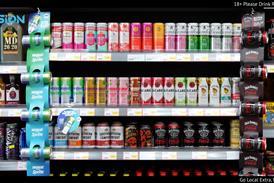


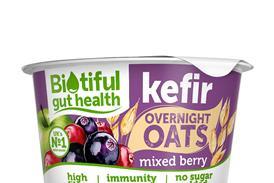
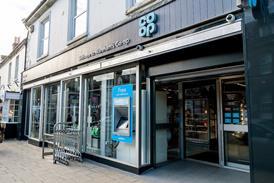
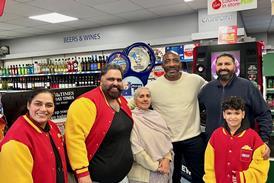
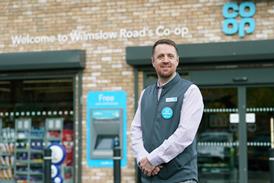

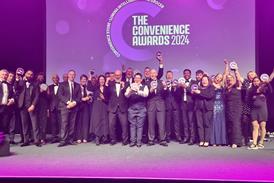




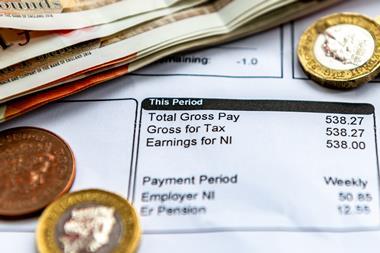
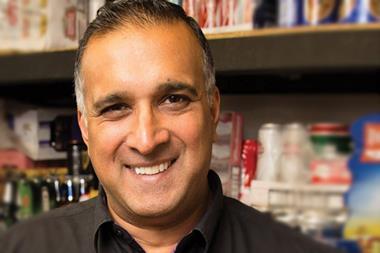

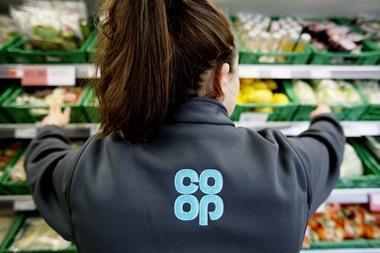

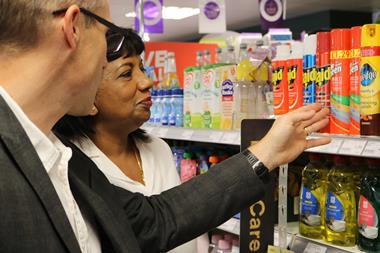
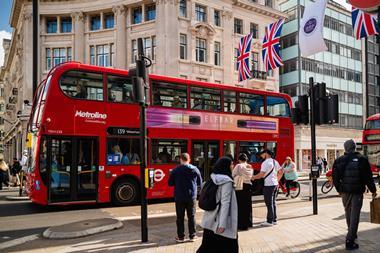
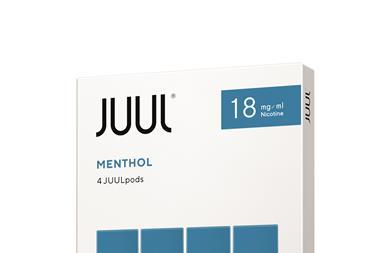
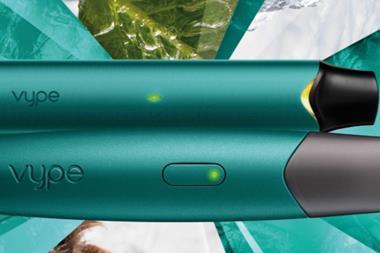
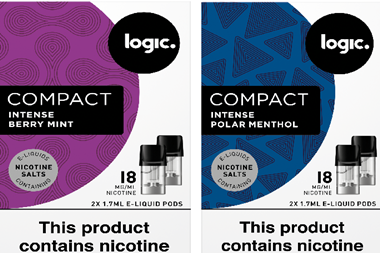
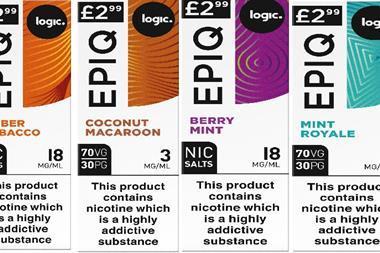
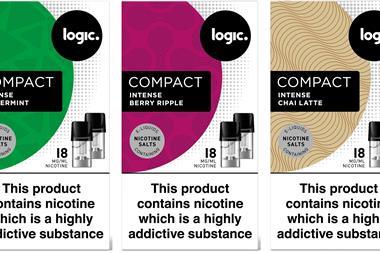
No comments yet